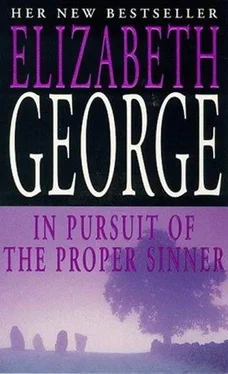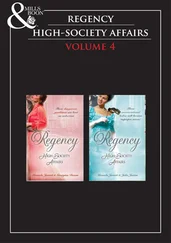Elizabeth George - In Pursuit of the Proper Sinner
Здесь есть возможность читать онлайн «Elizabeth George - In Pursuit of the Proper Sinner» весь текст электронной книги совершенно бесплатно (целиком полную версию без сокращений). В некоторых случаях можно слушать аудио, скачать через торрент в формате fb2 и присутствует краткое содержание. Жанр: Детектив, на английском языке. Описание произведения, (предисловие) а так же отзывы посетителей доступны на портале библиотеки ЛибКат.
- Название:In Pursuit of the Proper Sinner
- Автор:
- Жанр:
- Год:неизвестен
- ISBN:нет данных
- Рейтинг книги:4 / 5. Голосов: 1
-
Избранное:Добавить в избранное
- Отзывы:
-
Ваша оценка:
- 80
- 1
- 2
- 3
- 4
- 5
In Pursuit of the Proper Sinner: краткое содержание, описание и аннотация
Предлагаем к чтению аннотацию, описание, краткое содержание или предисловие (зависит от того, что написал сам автор книги «In Pursuit of the Proper Sinner»). Если вы не нашли необходимую информацию о книге — напишите в комментариях, мы постараемся отыскать её.
In Pursuit of the Proper Sinner — читать онлайн бесплатно полную книгу (весь текст) целиком
Ниже представлен текст книги, разбитый по страницам. Система сохранения места последней прочитанной страницы, позволяет с удобством читать онлайн бесплатно книгу «In Pursuit of the Proper Sinner», без необходимости каждый раз заново искать на чём Вы остановились. Поставьте закладку, и сможете в любой момент перейти на страницу, на которой закончили чтение.
Интервал:
Закладка:

Elizabeth George
In Pursuit of the Proper Sinner
The tenth book in the Inspector Lynley series, 1999
In loving memory of my father
ROBERT EDWIN GEORGE
and with gratitude for
roller-skating, on Todd Street
trips to Disneyland
Big Basin
Yosemite Big Sur
air mattress rides on Big Chico Creek
the Shakespeare guessing game
the raven and the fox
and most of all
for instilling in me
a passion for our native language

How sharper than a serpent's tooth it is
To have a thankless child!
– King Lear
June

PROLOGUE
What David King-Ryder felt inside was a kind of grief and a secondary dying. He felt overcome by a gloom and despair completely at odds with his situation.
Below him on the stage of the Agincourt Theatre, Horatio was reprising Hamlet's “Divinity That Shapes Us” while Fortinbras countered with “O Proud Death.” Three of the four bodies were being borne off the stage, leaving Hamlet lying in Horatio's arms. The cast-thirty strong-were moving towards one another, Norwegian soldiers coming from stage left, Danish courtiers coming from stage right, to meet up-stage from Horatio. As they began the refrain, the music swelled and the ordnance-which he'd initially argued against because of the risk of begging comparisons to the 1812 -boomed out in the wings. And at that precise moment, the stalls began rising beneath David's box. They were followed by the dress circle. Then the balconies. And over the music, the singing, and the cannons, thundered applause.
This was what he had craved for more than a decade: a complete vindication of his prodigious talent. And by God, he had it before him. He had it below him and everywhere round him as well, for that matter. Three years of mind-crushing, body-numbing labour were at this moment culminating in the standing ovation that had been denied him at the conclusion of his two previous West End productions. For those extravaganzas, the nature of the applause and what followed the applause had said it all. A polite and perfunctory recognition of the cast members had preceded a hasty exodus from the theatre, which itself had been followed by an opening night party not unlike a wake. After that, the London reviews had finished what the first night word-of-mouth had begun. Two hugely expensive productions sank like concrete battleships. And David King-Ryder had the dubious pleasure of reading countless analyses of his creative decline. Life Without Chandler was the sort of headline he'd read from the reviews of the one or two theatrical critics possessing an emotion akin to sympathy. But the rest of them-the types who crafted vituperative metaphors over their morning Weetabix and spent months waiting for the opportunity to plug them into a commentary more noted for its vitriol than its information-had been merciless. He'd been called everything from an “artistic charlatan” to a “vessel buoyed by past glories,” with those glories ostensibly burgeoning from a single source: Michael Chandler.
David King-Ryder wondered if other musical partnerships had undergone the scrutiny that his collaboration with Michael Chandler had. He doubted it. It seemed to him that musicians and lyricists from Gilbert and Sullivan to Rice and Lloyd-Webber had bloomed, had faded, had risen to prominence, had flourished, had failed, had vanquished critics, had stumbled, and had gloried all without the accompanying baying of the jackals that had snapped at his own heels.
The romance of his association with Michael Chandler had called for this analysis, naturally. When one partner of a team who mounted twelve of the West End's most successful productions dies in such a ghastly stupid way, then a legend is going to be born from that dying. And Michael had died just that sort of death: becoming lost in an underwater Florida cave that had claimed three hundred other divers, violating every rule of diving by going alone, going at night, going inebriated, and leaving only an anchored fifteen-foot boat to mark the spot where he'd entered the water. He left behind a wife, a mistress, four children, six dogs, and a partner with whom he'd dreamed of fame, fortune, and theatrical success from their shared childhood in Oxford, sons of assemblymen at the Austin-Rover plant.
So there had been a logic to the interest that the media had displayed in David King-Ryder's emotional and artistic rehabilitation following Michael's untimely death. And while the critics had battered him for his first solo attempt at pop opera five years later, they'd used fleece-covered clubs as if in the belief that a man who lost both his longtime partner and his lifelong friend in one fell swoop deserved at least a single opportunity to fail without being publicly humiliated in his effort to find the muse by himself. These same critics hadn't been so merciful upon his second failure, however.
But that was over now. That was the past.
Next to him in the box Ginny cried out, “We did it! David! We bloody well did it!” as she doubtless realised that-all charges of nepotism be damned when he'd chosen his wife to direct the production-she'd just risen to the sort of heights occupied by artists like Hands, Nunn, and Hall.
David's son Matthew-as his father's manager, knowing only too well how much they had at stake in the production-grabbed David's hand hard and said gruffly, “Damn. Well done, Dad.” And David wanted to warm to those words and to what they implied, a firm withdrawal of the initial doubts that Matthew had expressed when told of his father's intention to turn Shakespeare's greatest tragedy into his own musical triumph. “You're sure you want to do this?” he'd asked, and the rest of his remarks had remained unspoken: Aren't you setting yourself up for a final deadly fall?
He was indeed, David had confirmed at the time, if only to himself. But what other option did he really have than to try to restore his name as an artist?
He'd managed to do just that: Not only were the audience on their feet, not only were the cast members ecstatically applauding him from the stage, but the critics-whose seat numbers he had memorised, “the better to blow them up,” Matthew had noted sardonically-were also standing, making no move to depart, and joining in the sort of approbation that David had come to fear was as lost to him as was Michael Chandler.
That approbation only grew in the ensuing hours. At the opening night party at the Dorchester, in a ballroom creatively converted into Elsinore Castle, David stood at his wife's side, at the end of a receiving line comprising the production's leading actors. Along that line stepped London's foremost glitterati: Stars of stage and screen gushed over their colleagues and privately gnashed their teeth to conceal their envy; celebrities from all walks of life pronounced King-Ryder Productions’ Hamlet everything from “top notch” and “just fab, darling” to “kept me on the absolute edge of my seat;” It girls and Sloanes-slinkily attired, displaying an astonishing degree of cleavage, and famous either for being famous or for having famous parents-declared that “someone finally made Shakespeare fun ”; representatives from that notable drain on the nation's imagination and economy-the Royal Family-offered their best wishes for success. And while everyone was pleased to press the flesh of Hamlet and his thespian cohorts, and while everyone was happy to congratulate Virginia Elliott for her masterful direction of her husband's pop opera, everyone was particularly eager to talk to the man who'd been vilified and pilloried for more than a decade.
Читать дальшеИнтервал:
Закладка:
Похожие книги на «In Pursuit of the Proper Sinner»
Представляем Вашему вниманию похожие книги на «In Pursuit of the Proper Sinner» списком для выбора. Мы отобрали схожую по названию и смыслу литературу в надежде предоставить читателям больше вариантов отыскать новые, интересные, ещё непрочитанные произведения.
Обсуждение, отзывы о книге «In Pursuit of the Proper Sinner» и просто собственные мнения читателей. Оставьте ваши комментарии, напишите, что Вы думаете о произведении, его смысле или главных героях. Укажите что конкретно понравилось, а что нет, и почему Вы так считаете.












